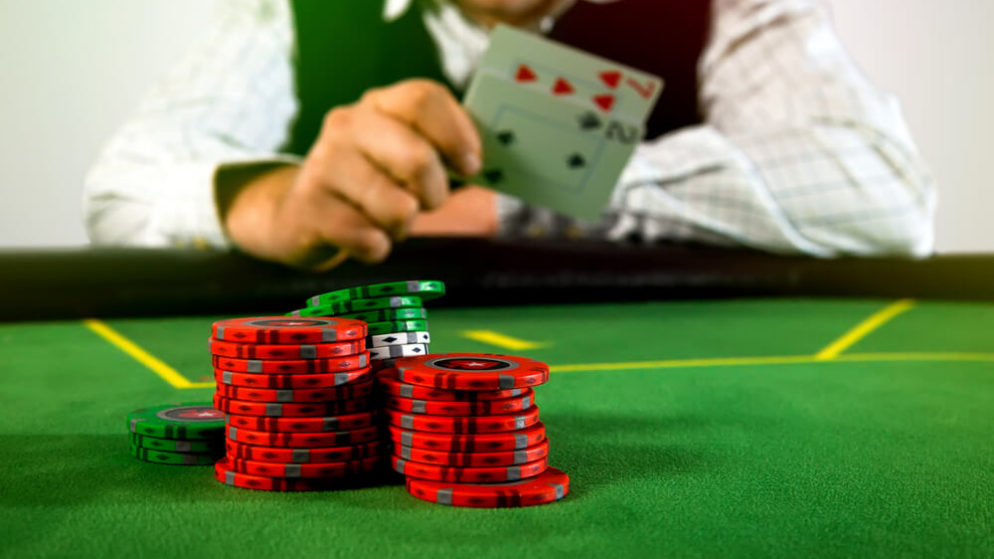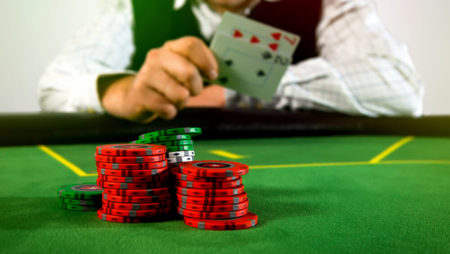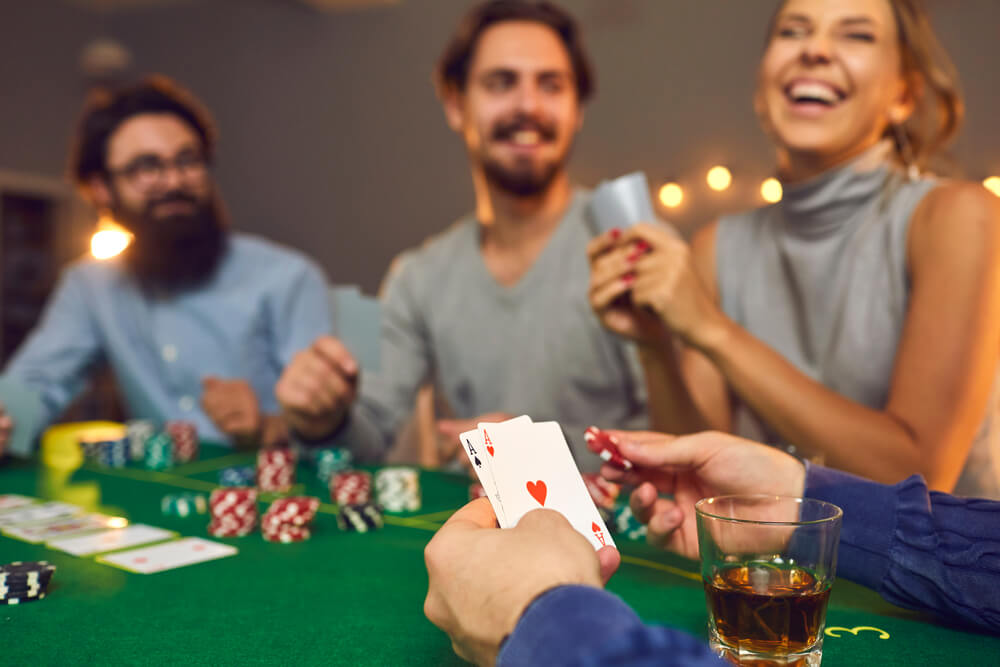

Gambling addiction — also referred to as gambling disorder, compulsive gambling, or disordered gambling — is an almost irresistible desire or urge to continue gambling despite the effects it has on your relationships, financial security, and health. Problem gambling is usually considered a hidden form of addiction because the symptoms and signs aren’t often obvious, unlike those associated with drug addictions.
Just like alcohol, drugs, and other addictive substances, gambling is known to stimulate the reward centers of the brain. It causes a rush of dopamine, a feel-good hormone, which is why it often leads to addiction. When you suffer from a gambling disorder, you tend to bet almost obsessively, often resulting in financial losses, debt accumulation, depletion of savings, or resorting to destructive behaviors like fraud, theft, or embezzlement in order to fund your addiction.
There’s no doubt, gambling addiction is a pressing scourge that can ruin families, destroy lives, and may lead to imprisonment. Thousands of people in New Jersey wrestle helplessly with this condition. What’s worse, most problem gamblers often hide their gambling habits and refuse to seek help out of fear of being judged or shamed.
Read on to find out more on how to spot gambling addiction.
What we cover
Gambling Addiction Defined
Gambling addiction is a nearly obsessive urge to indulge in gambling, even if it’s threatening the gambler’s happiness, health, or financial security. The thrill of winning and the promise of easy money excite certain brain centers in much the same way opioids, alcohol, and other drugs do.
According to estimates by the National Council on Problem Gambling, roughly 10 million Americans struggle with compulsive gambling. Even more concerning is that gambling addiction among New Jersey bettors is almost thrice the national average, according to a report from the Center for Gambling Studies at Rutgers University.
If not treated, gambling addiction can result in an array of financial and behavioral consequences, including imprisonment, bankruptcy, fraud, depression, and, even worse, suicide. Anyone can be a problem gambler but some people are more susceptible than others. There are certain factors that play into developing a gambling problem, such as genetics, alcohol abuse, anxiety, depression, emotional trauma, and so on.
Some people use gambling as a way to blow off steam and avoid dealing with certain realities of life like grief, depression, chronic illness, and anxiety. No matter the root, these habits are highly likely to lead to addiction. That’s because most gambling addicts usually use every means to conceal their betting activities from family, friends, and colleagues. They may start to act out of character or become socially distant.
Feelings of shame or fear of judgment may drive some problem gamblers to lie about their gambling activities and ruin their relationships. In response, they may be more distressed, restless, and irritable. More often than not, gambling addicts might resort to theft, fraud, or destructive borrowing in a bid to “chase losses.”
Thankfully, treatment of gambling addiction is available and recovery is possible with professional help. Even better, the state of New Jersey finances several treatment and education programs for problem gamblers. You can head over to the National Center for Responsible Gaming, the Council on Compulsive Gambling of New Jersey, and the state’s Casino Control Commission for more info on these programs.
Dangers of Gambling Addiction for New Jersey Residents
Gambling addiction can afflict people of all walks of life. It usually starts out as a fun, harmless activity before it turns into an almost uncontrollable obsession. As the Guardian found out, a problem sports gambler makes an average of 90 bets daily, wasting hours and hours while at it.
Whether you wager on sports, slots, poker, roulette, or scratch cards — at a gambling site, racetrack, or Atlantic City casinos — compulsive gambling can have serious health, financial, and emotional consequences. Problem gamblers may even do things they never imagined they would, such as embezzling money at work or accumulating massive debts. Even after taking advantage of casino bonuses and promotions, they go deep into their pockets to fund their gambling activities.
Let’s dive into some of the most common dangers of compulsive gambling.
– Emotional impacts of compulsive gambling
Being a compulsive bettor not only affects your relationships, health, and finances but can also cause deep emotional scars. As with most forms of process addiction, problem gambling is usually a dysfunctional coping system used to hide negative emotions and evade life’s problems and stressors.
For most gamblers, compulsive gambling is typically a self-distracting mechanism. Even so, it can take a huge toll on your emotional health. Biologically, when one gambles, it causes a rush of neurotransmitters like serotonin and dopamine, which are the brain’s happy-feel hormones. They are actually part of the brain’s reward centers.
As a consequence, gambling activities make you feel a momentary rush of happiness. This provides short-live relief from pain, sadness, and other negative emotions. The downside is that it makes you want more and more to feel good.
When the person isn’t gambling, the levels of their feel-good hormones fall well below normal, causing emotional anguish. As a result, they’ll feel irritable, unhappy, sluggish, and generally low. In other words, the person’s emotions become dysfunctional and imbalanced.
Chronic stress and depression arising from gambling addiction may cause health problems like migraines, insomnia, headaches, stomach ulcers, and even digestion & immune complications. Mood swings, drug use, and alcohol abuse may also worsen these conditions, so the person might have to gamble more and more to escape from their worries. It’s a vicious cycle of emotional ups and downs.
How compulsive gambling affects those around you

Studies have shown that problem gamblers are also likely to drive their partners, friends, or other loved ones into gambling. They often try to justify their gambling activities with a few instances of winning. Other gambling addicts blame others as a way of avoiding taking responsibility for their behaviors or seeking the necessary help.
While the problem gambler will certainly suffer from their addiction, their family, friends, and loved ones will also face the consequences. The anxiety, depression, and stress that the addicted person goes through may also cause arguments, secrecy, and irritable behavior.
Neglect of family responsibility, mounting debt, and calls from creditors will definitely erode or strain relationships. Financial hardships affect all members of the family and eroded relationships put a strain on everyone, including coworkers, friends, and extended family members.
When a parent becomes a gambling addict, it’s usually the children who bear the biggest brunt:
- They suffer emotional and even physical neglect and abandonment when their mom’s or dad’s focus is only on gambling.
- Irritable and stressed gamblers usually lash out at their kids. And, even if they don’t, kids usually sense when their parents are in trouble. This, in turn, may cause children some emotional distress and anxiety.
- Children with a family history of gambling addiction are at greater risk of becoming problem gamblers later in life.
As you can see, the consequences of problem gambling can affect everyone. Spending too much time and money gambling can result in strained relationships, ruined families, and mental anguish for those around you.
– Effects of gambling addiction on the community
Research has intimated that millions of dollars are lost to problem gambling every year. That’s money that could have fueled community development. This compulsive condition can have eclectic consequences and may cause gamblers to act uncharacteristically.
Compulsive gambling can cost the community economically in a variety of ways. Declaring bankruptcy, high rate of unemployment, home foreclosures, increased fraud, and check forgery can all impact our families and communities adversely. Poor physical, emotional, and mental health of problem gamblers and their loved ones can also reflect negatively on the community.
Problem gamblers are also at risk of drug and alcohol abuse, both of which strain the community. Gambling addictions may also put a severe toll on legal systems, correctional facilities, and public assistance programs.
– Risk of suicide or self-harm
People who gamble compulsively have higher rates of suicide than the general population. Problem gamblers most likely to self-harm or commit suicide are usually those who suffer from other mental health issues, such as anxiety, depression, and distress. The same is also true of those who drink excessively or abuse drugs.
Problem gamblers who have threatened to hurt themselves or attempted suicide before also at greater risk for a repeat attempt. If you or your loved one has been feeling suicidal because of a gambling addiction, it’s important to seek professional help immediately. You’re not alone; talk to someone you trust, whether a healthcare professional, family, or friend.
This isn’t limited to people who are addicted to gambling. Emotional problems, financial difficulties, and impaired relationships can deeply affect those around them, too. If not rectified, this can drive their partners and children to self-harm.
– Resorting to criminal activities
Most problem gamblers land in financial difficulties at one point as they chase losses. When they run out of money, they often resort to untoward behavior and criminal activities like check forgery, online fraud, theft, selling household items, and even embezzling funds at work to raise funds for gambling.
Gambling addiction overruns the gambler’s mind and takes over their life. As the mind is compromised and distorted, the gambling addict won’t be able to make the right decisions or think clearly. In most cases, this would lead to imprisonment, job loss, or family breakdown, all of which exacerbate their situation.
– Higher risk of family violence
There’s growing evidence that compulsive gambling may lead to gender-based and family violence. Family environments of problem gamblers are usually marked by ineffective communication, conflicts, and high levels of anger & irritability. People with gambling addiction are less likely to engage in family activities, participate in social events, commit to their loved ones, or express feelings of affection.
With increased cases of alcohol abuse, social deprivation, and resentment, problem gamblers are more likely to resort to violence to mask their addictions. As such, gambling addiction not only results in violence but also affects one’s intimate partners and other family members, such as grandparents, siblings, parents, and children.
– Other complications
You might be surprised by how many hours and money problem gamblers flush down the drain in the name of gambling. However, problem gambling can have other far-reaching and longer-lasting complications down the road.
- Divorce, family separation, and other relationship problems
- A poor general sense of well-being.
- Job loss or wanting work performance
- Legal issues
What Causes Gambling Addiction?
When someone develops a gambling addiction, the insula tends to become hyperactive. This is an area of the brain that’s responsible for your body’s rewards system. The overactive insula may cause distorted thinking. For example, a problem gambler may start to “notice” patterns in random sequences, so they continue to gamble even after losses and near-misses.
In saying so, the gambler’s brain may get triggered by a gambling activity in a similar way a drug addict’s brain responds to drugs. The more they feed their gambling habits, the worst the addiction will become. Even so, researchers have only scratched the surface when it comes to compulsive gambling. In fact, it isn’t fully known what drives a person into obsessive gambling.
As with most process addiction, compulsive gambling may be caused by a blend of environmental, genetic, and biological factors. For instance, it’s been recently discovered that 1 in 5 problem gamblers also suffer from clinical depression and/or anxiety. Exactly which causes the other is also not yet well-understood.
Because the exact causes are not clear, it may help to look at things that put a person at greater risk of becoming a compulsive gambler.
Gambling Addiction Risk Factors
Betting on sports, playing casino games, and other forms of gambling are usually deemed to be socially acceptable when done in moderation. In fact, most people who gamble never become problem gamblers.
However, there are certain factors that may increase one’s risk of developing a gambling addiction. The following are risk factors that are usually linked to disorder gambling:
1) Age: Problem gambling is more rampant among middle-aged and younger individuals than older adults. Perhaps that’s because adults are typically more risk-averse than young people who view mistakes as lessons.
Studies seem to suggest that people who gamble as children, tweens, or teens are more likely to develop gambling disorders than those who don’t. That has been used to partly explain why children of former problem gamblers are at greater risk of developing compulsive addiction. That’s not to say that gambling addiction in older adults isn’t a big deal. If left untreated, at any age, compulsive gambling can adversely affect one’s family ties, financial situation, health, and other aspects of their life.
2) Sex: Unsurprisingly, gambling addiction has been shown to be more common in male gamblers than their female counterparts. However, while most women often start to gamble much later in life, they may become compulsive gamblers more quickly.
Several studies, including one published in 2016 in the Journal of Gambling Studies, have attributed gender differences in gambling addiction to social anxiety, impulsive coping, risk-taking tendencies, and environmental factors.
Interestingly, in recent years, gambling addiction patterns among women and men gamblers have become almost similar. In fact, women in Sweden are said to be more likely to become compulsive gamblers than men, according to a BBC report.
3) Mental health disorders: Cases of substance abuse and alcoholism are often common in people with problem gambling, and the same is also true for people with a history of anxiety, depression, or personality disorders.
There’s also mounting evidence that disorder gambling may have some links to other mental health disorders like attention-deficit/hyperactivity disorder (ADHD), obsessive-compulsive disorder (OCD), and bipolar disorder.
4) Certain medication and drugs: As we’ve made it clear repeatedly, people who gamble obsessively may also have problems with drug addiction, be that alcohol, cocaine, heroin, or other forms of drug abuse addiction. It so happens that certain medications, like those used to treat restless legs syndrome (RLS) and Parkinson’s disease, may lead to gambling addiction.
This class of drugs known as dopamine agonists has a unique side effect in which it may cause compulsive behaviors, such as pathological gambling, in some patients.
5) Peer pressure and family influence: This is a big one when it comes to gambling engagement and addiction. Turns out, if your close friends, colleagues, or family members gamble compulsively, the odds are high that you will, too. This is a rare combination of genetic and environmental factors at play.
6) Some personality traits: Believe it or not, certain personality qualities may put you at an increased risk for gambling addiction. People who are generally easily bored, impulsive, restless, workaholics, or highly competitive may be likelier to develop compulsive gambling than those who don’t have these characteristics.
How to Spot Gambling Addiction in New Jersey
Are you or your loved one a compulsive gambler? While most problem gamblers go to great lengths to hide their gambling activities, there are some obvious and not-so-obvious signs that symptomize this condition.
– Uncontrollable urge to bet
Do you have a burning urge to continue gambling even if the negative consequences are so obvious? If you find yourself not being able to stop gambling when you’re ruining your health, relationship, and financial security, then you might have compulsive gambling.
Do you have difficulty controlling your betting? Once you begin betting, do you find it hard to stop or take a break? Do you keep increasing the wagering amount until you have used the last cent on gambling?
– Gambling is literally taking over your life
Compulsive gamblers are usually too preoccupied with gambling that they forget their hobbies, families, friends, health, and other aspects of their lives. If you’re constantly looking for ways to phony up gambling money, then you need to stop and re-examine your betting habits before they turn into a full-fledged addiction.
– Desire to gamble more and more money
At first, gambling is fun and harmless because you’re betting only small, reasonable amounts. But when you need to bet with larger amounts of money to get the same thrill, then you may have crossed the line from a recreational bettor to a compulsive gambler. Do you gamble more than you can afford to lose?
– Other people criticize or complain about your gambling habits
Has a family member, friend, or coworker criticized your gambling? Has anyone told you that you may have a gambling problem? If so, you may be a problem gambler or on your way to becoming one. In either case, it helps to assess your gambling behavior or, better yet, dial it down, seek professional help, or quit gambling altogether.
– You gamble as a coping mechanism
Most compulsive gamblers gamble to relieve their feelings of depression, sadness, anxiety, guilt, or helplessness. Some do so to escape problems, like family issues, money problems, chronic illness, and so on.
If you have ever felt guilty or ashamed of the way you bet, then you should consider seeking help before it becomes worse. Do you fear or feel guilty about the consequences of your gambling?
– The need to lie about your gambling or keep it a secret
Do you often lie or feel the need to be secretive about your betting behavior? You may hide your gambling and lie about your losses, thinking that others won’t get you or understand that you are having fun. Perhaps you feel that you’ll surprise those around you with a big win to justify your gambling obsession.
– Chasing losses
If you “chase losses,” the chances are good that you’re a problem gambler. Trying to win back lost money is always a telltale sign of someone with a gambling addiction, but it usually results in more losses.
– Dysfunctional and uncontrollable emotions
Being a compulsive gambler is typically a dysfunctional way of coping with life’s ups and downs. You may be using it to mask depression, anxiety, and other problems in your life. That’s why certain emotions are often tied to gambling addiction, such as being distressed, anxious, restless, or unhappy.
Because gambling appeals to the brain’s rewards center, you will need to gamble more and more to experience the same thrill of happiness. As a consequence, most compulsive gamblers feel irritable, sad, sluggish, and generally low-spirited when they aren’t betting. Their emotions become not only dysfunctional but also tend to be uncontrollable and dis-regulated.
Angry outbursts, mood swings, impulsive anxiety, and unexplained feelings of unhappiness may also be associated with compulsive gambling.
– Going into debt to fund your gambling
Another common symptom of compulsive gambling is borrowing money or taking out loans to gamble. It’s one of the most significant financial downfalls that compulsive gamblers encounter. They’ll use bank loans, credit cards, or even mortgage refinancing to pony up money for gambling. Once the standard borrowing channels dry up, they often resort to unquestionable ways like getting cash from loan sharks, signing up for payday loans, or getting ultra-high interest credit cards.
Some problem gamblers will not stop there. They’ll go above and beyond to lay their hands on some cash for gambling. Some may resort to fraud, identity theft, drug trafficking, embezzling, and even theft in a bid to make lady luck dance.
– Gambling to the last dollar
The compulsive urge to gamble often becomes so strong in problem gamblers that losing life savings won’t make them stop gambling. They tap into their retirement savings, gamble away money for mortgage payments, and put important bills to the back-burner.
In other words, compulsive gamblers go for broke. Their addictions compel them to gamble down to the last penny. They won’t stop until all the money has gone to the “house”.
When all’s said and done, compulsive gambling is characterized primarily by an uncontrollable urge to gamble. A compulsive gambler won’t simply stop. They may try every means to cut back, quit, or stop, but they can’t seem to shake off the impulse. Most of them relapse and gamble even more obsessively than before.
Ways to Treat Gambling Addiction in New Jersey
With proper treatment, it’s possible to curb compulsive gambling and addiction. It’s in your best interest to stop gambling altogether because even recreational or casual betting can result in a more severe relapse.
The secret to successful treatment of gambling addiction is to identify and address the underlying causes. That’s where a gambling addiction treatment, education, or recovery program will come in handy.
Rehabilitation programs: There is a myriad of inpatient and outpatient rehabilitation programs for gambling addicts. Inpatient facilities are best suited for people who want to stop going to casinos or other betting venues. Outpatient programs, on the other hand, might be more suitable for mild cases of gambling addiction – they include 1-on-1 therapy, group sessions, gambling anonymous meetings, and other educational classes.
Cognitive-behavioral or psychotherapy programs: In addition to rehabilitation, support, and counseling sessions, compulsive gamblers may also benefit from in-person psychotherapy. They will help deal with cases that stem from avoidance and deeper emotional problems.
Lifestyle modification: Battling the social, emotional, and financial consequences of compulsive gambling can be tricky. At first, you may have to hand over financial responsibilities to a trusted partner, friend, or loved one. You may also need to avoid friends, situations, and places that might trigger a relapse, such as sporting events, casinos, gambling sites, bars, and so on.
Medications: In rare situations, your doctor may prescribe medications to help you curb your urges and impulses to gamble. This is usually when compulsive gambling is due to an underlying emotional or mental health disorder like ADHD, OCD, or bipolar disorder.
12-Step programs: This usually comes in the form of attending a Gambling Anonymous (GA) program. Just like Alcoholics Anonymous, this is typically a twelve-step recovery program. More about these programs are highlighted by the New Jersey Casino Control Commission, 1-800-GAMBLERS, and the New Jersey State Lottery.
You may also find the National Council on Problem Gambling, Debtors Anonymous, Gamblers Anonymous, and local self-help/support groups to be extremely useful.
Self-Exclusion: There are multiple self-exclusion programs that allow gamblers to block themselves, either permanently or temporarily, from gambling at betting venues. That’s why it is important to sign up at regulated and legitimate casinos, poker sites, and sportsbooks that support self-exclusion programs.





